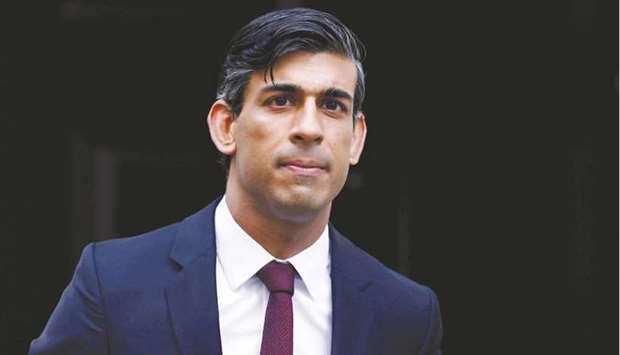Chancellor of the Exchequer Rishi Sunak promised he will be “honest” with the British public, signalling potential tax rises ahead to fill the gaping hole in the UK finances wrought by the pandemic.
“We do have a challenge in our public finances and if we don’t do anything, borrowing will continue to be at very high levels even after we’ve recovered from Covid; debt will continue to rise indefinitely,” Sunak said yesterday in a Sky News interview. “That’s not a good situation.”
Speaking before Wednesday’s budget release, he said he will “level with” the public and outline a blueprint to address the deficit in a “fair” way.
The chancellor’s comments hint at tax rises and spending cuts to close a budget deficit that the Office for Budget Responsibility has said is on course to swell to £394bn ($549bn) – or 19% of gross domestic product – this year. The Institute for Fiscal Studies has estimated he may need to bring in tax increases of about £60bn in coming years in order to balance the books.
Officials have already suggested that US plans to raise corporate taxes give the UK scope to do likewise, while still retaining the lowest rates in the Group of Seven major industrialised economies.
“The rise in bond yields over the past month, if it sticks, would mean debt interest costs as a share of GDP average 1.2% over the five years rather than 1%. Debt servicing costs have averaged 1.7% since 2000,” says Dan Hanson, senior UK economist at Bloomberg.
And the Sunday Times reported that the chancellor plans to freeze the thresholds at which people start paying both the basic rate of income tax and the higher rate, pushing 1.6mn people into a higher bracket before the next general election in 2024.
Sunak yesterday refused to comment on specific fiscal measures, including when asked whether freezing income tax thresholds was consistent with the Conservative Party’s election manifesto pledge in 2019 not to raise the three main rates of tax: income tax, national insurance and value added sales tax.
Conservative Party grandees including former chancellors Ken Clarke and Norman Lamont as well as opposition Labour Party Leader Keir Starmer have warned against putting up business taxes in the upcoming budget.
Sunak appeared to agree with them when asked whether now is the right time to raise corporation tax, telling BBC News yesterday “now is the time to keep supporting the economy.” That suggests any tax increases he signals in the budget aren’t likely to take effect immediately. Another budget is due in the fall.
Measures To Be Included in the March 3 Budget:
n £5bn of grants worth up to £18,000 each to help nearly 700,000 eligible businesses in the retail, hospitality, accommodation, leisure and personal care sectors reopen
n The world’s first sovereign green savings bond for retail investors. The funds raised will be earmarked for projects such as renewable energy and clean transportation
n A mortgage guarantee programme for 95% mortgages to help people get on the property ladder
n£22bn of capital and loan guarantees to capitalise a new national infrastructure bank, with the aim of supporting £40bn of infrastructure investment.
n £375mn for a new public-private fund to invest in fast-growing tech start-ups. £126mn for traineeships, and an increase to £3,000 in the for hiring apprentices. A new fast-track visa programme to help financial technology and cyber companies attract international talent
The chancellor said he would lay out his plan to shore up the finances in his budget presentation. “I want to level with people about that, about the problem that that causes and the challenges that it presents us with and be honest about our plan to address those,” he said.
Sunak told the BBC that he didn’t “recognise” reports that he told Conservative members of Parliament he wants to cut taxes before the next general election in 2024, but stressed: “I’m a Conservative and I believe in lower taxes.”
The chancellor has committed some £300bn to fighting coronavirus and supporting businesses and workers through the pandemic this fiscal year in an attempt to buttress the economy against the worst effects of three damaging lockdowns.
He pledged to keep supporting workers and jobs as the economy reopens, telling Sky: “We went big, we went early, and there’s more to come next week.”
Prime Minister Boris Johnson has announced a four-step plan to ease pandemic restrictions that will mean some businesses have to wait until June 21 at the earliest to reopen. Sunak said he wants “to support people and businesses along that path.”
“I said at the beginning of this crisis that I would do whatever it took to protect people families and businesses through this crisis,” he said when asked if his flagship furlough programme would be extended beyond the end of April. “I remain completely committed to that.”
The outbreak plunged the UK into its deepest recession since 1709, pushing the national debt above 2tn pounds for the first time. While historically low interest rates mean the new pile of debt is manageable for now, Sunak warned of the risk future rises in interest rates pose to the Treasury.
“Interest rates have been at very low levels, which does allow us to afford slightly high debt levels but that can always change,” he said. “I want to make sure, when the next shock comes along, whoever’s sitting here can do the same thing that I’ve done. They need strong public finances to do that.”

u201cWe do have a challenge in our public finances and if we don’t do anything, borrowing will continue to be at very high levels even after we’ve recovered from Covid; debt will continue to rise indefinitely,u201d Sunak said yesterday.
